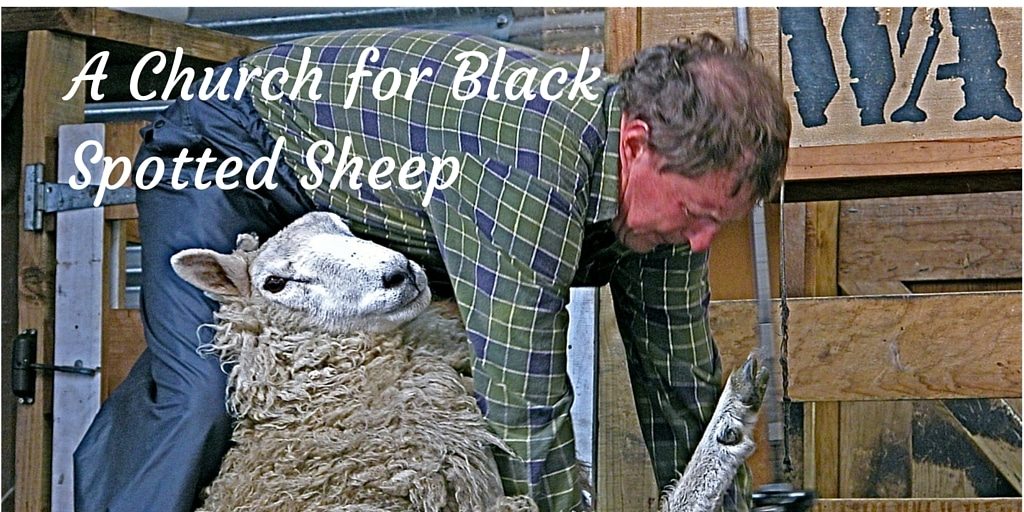I was always on the lookout for black wool.
I raised on a sheep farm here in New Zealand and whenever shearing time came around I was in the shearing shed working alongside those lean muscular men, shearing our sheep.
Whenever I spotted some black wool coming coming off the back of a placid sheep I would call my father. In an instant he would get a big lump of chalk and mark that sheep. We would then carefully tease out that black wool from the rest of the fleece. We didn’t want the black wool to contaminate that purity of the white fleece.
Later my father would cull out that sheep from the flock so that it could not breed and pass on that trait of black wool.
We wanted purity of white fleece.
Ever felt rejected? Ever felt that if people knew what your ‘Black Spots’ were they would cull you out of the flock?
Perhaps in your church the appearance and projection of purity is valued highly.
One of the saddest experiences I had in ministry were the all too often conversations with people who wanted to be part of ‘The Church’ yet felt, and truly believed, they would be rejected by the people in the Church if they truly knew what they were like.
The words spoken would be along the lines of
- ‘If you really knew me you would reject me’
- ‘If you knew what I had done you would reject me’
- ‘If you knew what had been done to me you would reject me’
For some they believed they had a type of contagious disease and that they best stay away or it might spread and hurt others.
For some it had been part of their abuse. They had been told they were useless, unlovable, and that they had no value. Evil atrocities of the tongue had been laid down on their souls.
I would try to explain that if the flock of God, the people of the church, were to be shorn and inspected closely that there would be many ‘black spots’. Too many to number, and too many to hide perfectly.
Sure attempts were made to hide under smiles and pretence, but under the fluffy, woolly white appearance there would be black spots alongside bruises and shadows of long held pain.
One of Jesus’ followers, Luke, relates a moment in Jesus’ life.
By this time a lot of men and women of doubtful reputation were hanging around Jesus, listening intently. The Pharisees and religion scholars were not pleased, not at all pleased. They growled, “He takes in sinners and eats meals with them, treating them like old friends.” Their grumbling triggered this story.
“Suppose one of you had a hundred sheep and lost one. Wouldn’t you leave the ninety-nine in the wilderness and go after the lost one until you found it? When found, you can be sure you would put it across your shoulders, rejoicing, and when you got home call in your friends and neighbours, saying, ‘Celebrate with me! I’ve found my lost sheep!’ Count on it—there’s more joy in heaven over one sinner’s rescued life than over ninety-nine good people in no need of rescue. Luke 15:1-7
Is your church a place where people of doubtful reputation hang around and listen intently?
Does your church foster times and places where people of ‘doubtful reputation’ are welcomed to eat, dine, and live out large. A freedom to be their ‘black spotted’ selves.
I think we all want relationships where we don’t have to pretend we have a pure white woolly fleece. Where, if it all came off, and the truth was fully known we would be welcomed by other naked and vulnerable, black spotted ruminants. That we would not face the culling knife of rejection.
All too often we are locked up in a fear of rejection whereas we really just want a Jesus of engaging acceptance.
How do we create places for those of ‘doubtful reputation’
- Recognise your own ‘doubtful reputation’ black spots. Accept that you too are just like them. Unless you can acknowledge that you too are just like them then immediately there will be a barrier to connection.
- Look beyond the ‘Black Spot’. We get so focused on what is wrong that we overlook the good God is doing. Is there something here that God wants you to be involved with yet focusing in on what is black distracts you away from the real story going on. Prayerfully ask for a compelling vision that allures you to hope.
- Listen for the less than obvious needs. Look beyond the easy to fix problems to where the core needs of relationship are. You may be able to easily feed the stomach, but what about the needs of the soul. Food banks, community meals, budgeting advice etc are all good but do you have a soul food bank where tin cans of encouragement and wisdom are freely given. What about a community meal of soul food touching the very core needs of the suicidal, anxious, and lonely. Love needs to go deep, not shallow, if it is going to change the soul.
- Communicate in ways they will listen intently. Jesus spoke through stories, parables and actions. He used a language the common man fully understood. Short and snappy too. Why do we have such long sermons in Church? Is it to impress? People listened to Jesus because he spoke to the heart from the heart for the heart’s sake. He spoke in such a manner that every word was easily remembered and digested into the soul.
What spurred me to write this post?
A couple of things.
- The ongoing ‘one size fits all’ approach to how we do Church. That generally churches expect people with Major Mental illness to just slot into the way they do things. There is no accounting for anxieties, phobias, potential triggers, attention spans, literacy, monetary constraints etc..
Think about this example which I have witnessed.
Pastor Bob stands up and announces a new teaching program for the Church.
‘In the next month we are going to work through the ‘The Purpose Driven Shack of Jabez’. You can get a copy for $15 from the foyer, and we really want everyone to be part of this.
Instantly a couple of challenges.
- Can I afford it?
- Do I want others to know of my financial struggles so as I can get a copy given to me?
- Will I be able to read it? There are a lot of words in it and my concentration span isn’t the best.
- Will I be considered on the outside of the church community if I am not part of this?
- How am I going to respond in situations where people are discussing what they are reading?
Put yourself in their shoes and examine the range of feelings and thoughts going through the mind then read this passage from James.
If a man enters your church wearing an expensive suit, and a street person wearing rags comes in right after him, and you say to the man in the suit, “Sit here, sir; this is the best seat in the house!” and either ignore the street person or say, “Better sit here in the back row,” haven’t you segregated God’s children and proved that you are judges who can’t be trusted?
Listen, dear friends. Isn’t it clear by now that God operates quite differently? He chose the world’s down-and-out as the kingdom’s first citizens, with full rights and privileges. This kingdom is promised to anyone who loves God. And here you are abusing these same citizens! James 2:2-5
2. A desire deep within me to help. There is a burden in me to provide resources and support that can help individuals and groups touch the souls of those with Major Mental illnesses. This is why I write this blog. I want to see Spiritual formation as a key component in developing Mental Health.
There is a big red button within me that gets regularly pushed. It’s when pastors and churches do things, often without any awareness, that set up barriers and hurdles for those with ‘black spots’ or of ‘poor reputation’ that simply want to hang out with Jesus.
Do you have that Red Button? Are you even aware of those little barriers that churches can unwittingly put up to the Spiritual Formation of those with Mental Illness.
Years ago a pastor once used the word ‘Assimilation’ to describe the process of involving new people into the life of the Church. I just about burst out in laughter as I thought of Star trek references and these Aliens called the Borg.
Travelling through space in a cube shaped spacecraft they would capture anyone coming near them. With menacing robotic tones they would say ‘You will be assimilated’. The hapless victims would then be taken in and made into a Borg.
I don’t think he was quite meaning this, but it did make me laugh.
I prefer the word Connection where both parties are connected into each other. Where there is free flow back and forth of what is most needed and alive in each of them.
Does your Church ‘Assimilate’ or ‘Connect’?
Quote Food for thought
‘An embrace involves always a double movement of opening and closing. I open my arms to create space in myself for the other.
The open arms are a sign of discontent at being myself only and of desire to include the other. They are an invitation to the others to come in and feel at home with me, to belong to me.
In an embrace I also close my arms around the others – not tightly, so as to crush and assimilate them forcefully into myself, for that would not be an embrace but a concealed power-act of exclusion; but gently, so as to tell them that I do not want to be without them in their otherness.
I want them in their openness. I want them to remain independent and true to their genuine selves, to maintain their identity and as such become part of me so that they can enrich me with what they have and I do not’.
Judith M Gundry-Volf, Miroslav Volf. A spacious heart: essays on identity and belonging. (Trinity Press International, 1997, 58-59.)
Questions to consider.
- What stops the embrace?
- How can I help you to create places where ‘men and women of doubtful reputation’ can come and ‘hang out with Jesus, listening intently’? Leave a comment below
Barry Pearman
Image: Get me down under

Barry is a writer, coach, and course creator that has a passion for empowering Mental Health through Faith, Hope, and Love.
Get two free ebooks. One about Depression and one about Spiritual Exercises that will help your Mental Health






4 thoughts on “A Church for Black Spotted Sheep”
Great words Barry thanks. I am passing this on! I guess the ‘black spots’ cover many things apart from mi, which churches can decide they do not want.
Thanks Miriam, and thanks for passing it on to others.
Hi Barry,great to see you continuing with this,the inclusion rather than “exclusion’ of those of doubtful reputation,such a great reminder of good times in the Living Room,keep it up!Mark
Thanks Mark, great to hear from you and your comment.